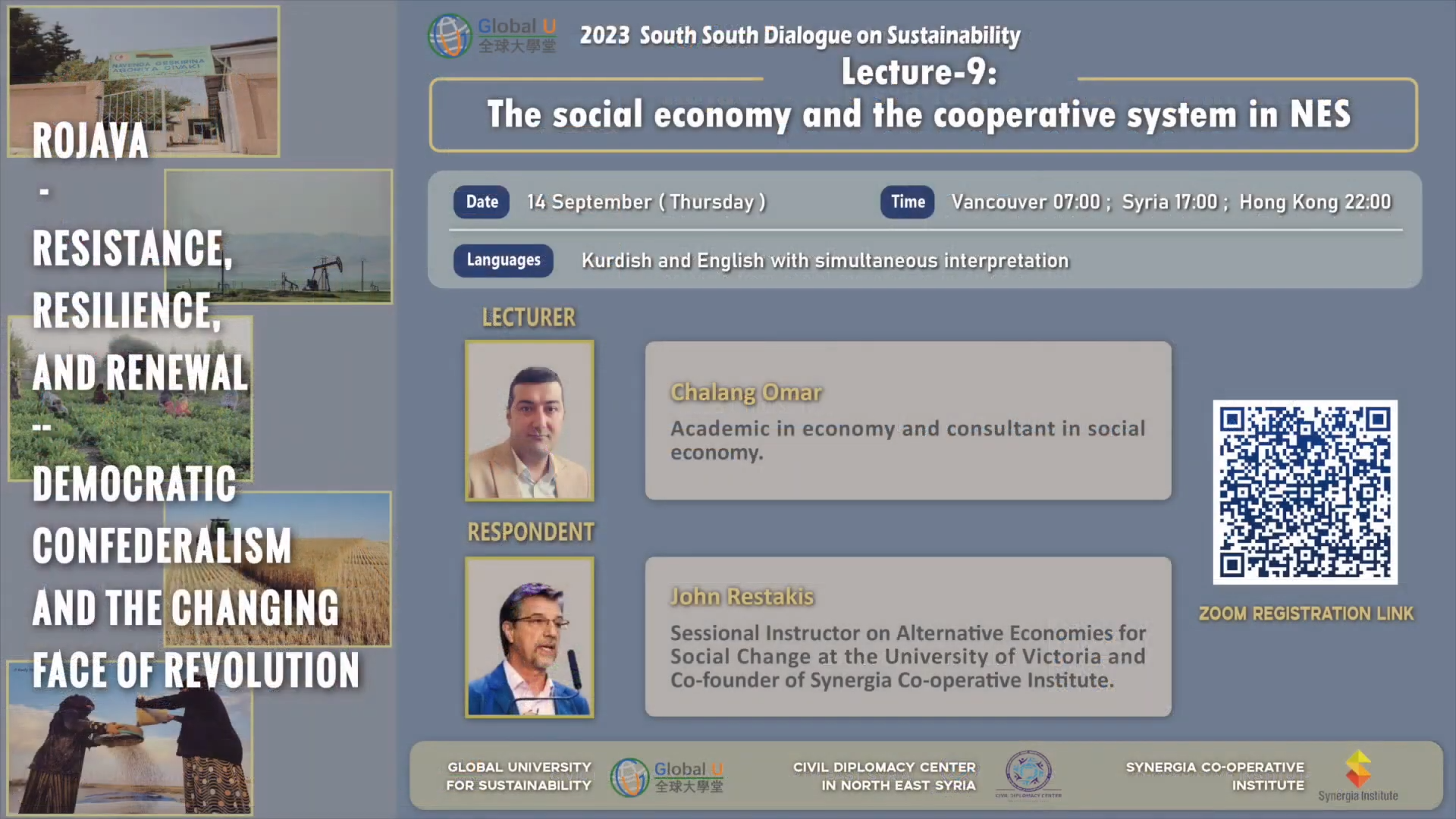- Moderator: John Restakis (Synergia Co-operative Institute)
- Lecturer: Chalang Omer, Academic in Economy and consultant in social economy.
- Respondent: John Restakis, Sessional Instructor on Alternative Economics for Social Change, University of Victoria; Co-Founder of Synergia Co-operative Institute.
In this video, Chalang Omer outlines both the background and development of the social economy in Rojava. The principles of social economy have a deep history in the region, beginning in Mesopotamia. The establishment of the first agricultural societies in Kurdistan also gave rise to sacred myths, the matriarchal fertility religions of Mesopotamia, and the practice of co-operation in the productive process of the villages. The rise of city culture in Sumeria during the Neolithic era gave rise to hierarchy, the state, and the establishment of patriarchy.
Chalang Omer then summarizes the attempts by colonial powers to dominate and control the lands and resources of Kurdistan. Economic occupation, imposed by colonial powers and the nation state, makes self-determination impossible.
A social economy is essential to the creation of an alternative solution through the creation of democratic confederalism. In this approach, economic production can work hand in hand with environmental protection. The key here is re-establishing the sovereignty of society over the economy. An independent social economy is neither a capitalist economy nor a state-controlled economy. Social economy is based on ecology and its aim is to provide for society’s needs while protecting nature. The empowerment of women in the economy is also key to this model. Moreover, a social economy can co-exist with private ownership and enterprise, but re-organized within a frame of wider social and environmental values. This, in turn, aligns with the principle of economic freedom which is stipulated in the social contract of Rojava.
The social economy also embodies principles of social justice. This includes the minimization of inequality and providing access to essential goods and services such as education, health care, and services to the vulnerable members of society.
The establishment of communes and co-operatives were seen as key to the success of this vision. The fields with had been appropriated by the regime from the Kurds have now been made the property of the communes and used by the co-operatives for productive development. In this process some 200 co-operatives were established but there were also weaknesses in the structure of the co-ops and the attitudes of the populace, who had been raised within an oppressive authoritarian system. Other challenges include the absence of funding, competition from the private sector, the reliance on the Syrian pound, and of course, the war and the ongoing aggression of Turkey and the embargo. The co-ops were not able to play the role that was hoped for them and today the number has been reduced to about 100.
What is needed now is a new approach for the development of co-operatives and the training of members. In addition to the co-ops, the establishment of trade unions is a key element in this model. Trade unions have been established for farmers, workers and also shopkeepers, with a total of some 240,000 members.
In outlining the many challenges faced by co-operatives and the creation of an alternative economic model, also Chalang notes that the economic system of the region is too heavily dependent on the sale of petroleum. This is recognized as a problem, a contradiction to the principles of social economy, and unsustainable because of the damage done both to the environment and for the evolution of the economy as a whole.
John Restakis responds by highlighting the importance of what Rojava has been trying to achieve, and the value of communication and exchange between Rojava and the co-operative movements of other regions. Restakis outlines some of the essential differences between social economy and the centralized models of communism on the one hand and the free market model of contemporary capitalism and neo-liberalism on the other, and concludes with a reflection on the kinds of social institutions that need to be established to sustain a social economy over the long term.

